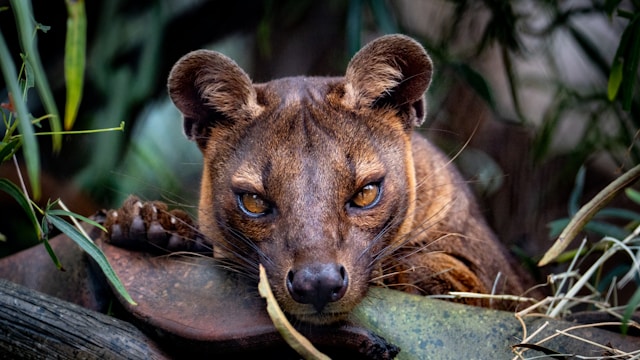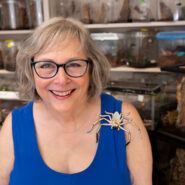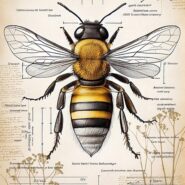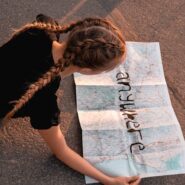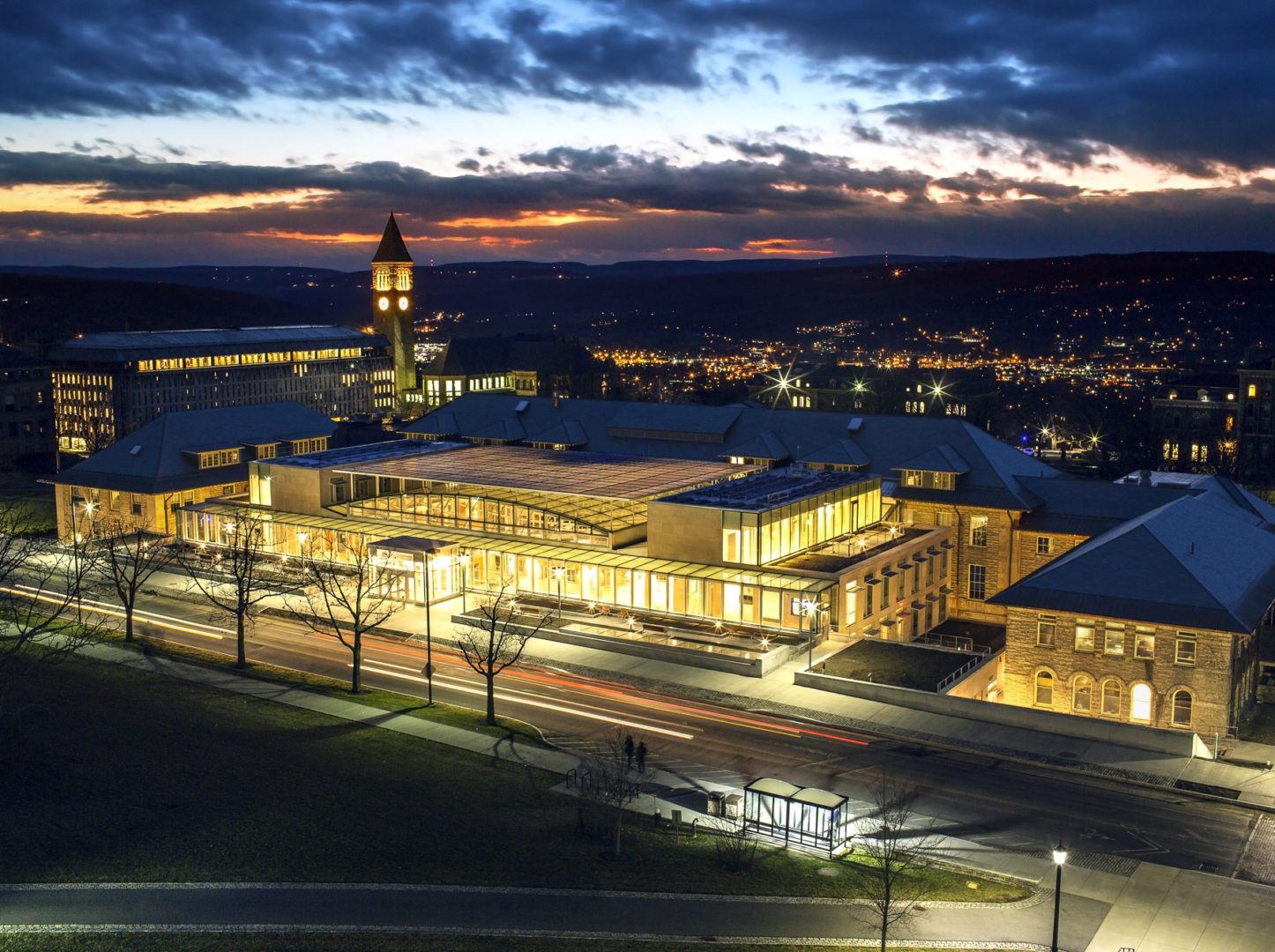Track the elusive fossa, marvel at shimmering geckos and rare lemurs on moonlit forest walks, and breathe in the humid, green scent of Madagascar’s rainforest rising around you.
Madagascar:
Lemurs, Chameleons, & Baobabs. Oh, My!
July 22 – August 6, 2026
Featuring Cole Gilbert, Director of Undergraduate Studies in Entomology & Professor of Insect Physiology and Linda Rayor,
To reserve your space, contact CAU partner Distant Horizons
Phone: 562-983-8828 | Email: emilyw@distant-horizons.com
Limited to 21 participants
Download the Brochure:
“I consider them to be two of the best professors that we have traveled with on a CAU Study Tour.” ~Fayvian Lee, P ’99
Unlike anywhere else on Earth
-
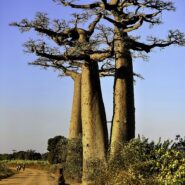 Download the BrochureDownload
Download the BrochureDownloadClick "Download the Brochure" to access:
- rates (page 15)
- terms (page 15)
- to learn about your accommodations (pages 13 -14)
- and more!
Download the Brochure
-
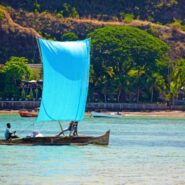
Madagascar, the fourth largest island in the world, is a land of unparalleled natural beauty and biodiversity. Discover towering limestone pinnacles, some of the world’s most unique flora and fauna, and dense rainforests teeming with wildlife including lemurs, chameleons, birds, and so much more!
-
 Lemurs
LemursMadagascar is famous for its lemurs, with over 100 species and subspecies found nowhere else on Earth. Our plan is to see as many as possible!
-
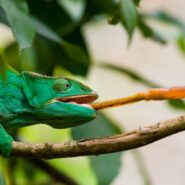 Chameleons
ChameleonsThe island is home to half of the world’s chameleon species, including the tiny Nosy Hara leaf chameleon.
-
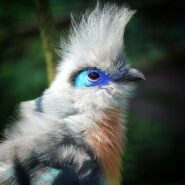 And birds
And birdsMany bird species found in Madagascar are not found anywhere else in the world including the Madagascar Fish Eagle and the Madagascar Pochard, a critically endangered diving duck, rediscovered in 2006 after being thought extinct!
-
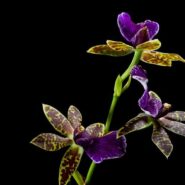 Oh my!
Oh my!On top of the wildlife, you will also experience the massive baobab trees of Isalo and Tana; a vast array of endemic plants, including orchids, palms, and the iconic Madagascar periwinkle; the dense, lush rainforests of Ranomafana and Andasibe-Mantadia National Parks; the dry, spiny forests of the southwest; and beaches with clear turquoise waters, rich in marine biodiversity.
-
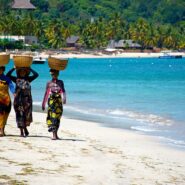 As well as rich cultural heritage
As well as rich cultural heritageAs we drive through rural areas you will learn more about the island’s rich cultural heritage and diverse ways of life. Malagasy villages vary significantly across different regions, reflecting the distinct cultures of the various ethnic groups inhabiting the island.
What to Expect
-
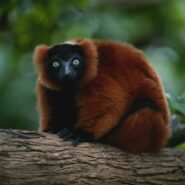
To enjoy this program to its fullest you should have a spirit of adventure, boundless energy, and be physically prepared for the rigors involved.
It's also good to know that this trip includes:
- To ensure you get to see the most of this incredible destination, there will be several very long days of driving on poorly surfaced narrow roads with many potholes. Please expect some bumpy rides.
- Daily walks of at least three miles a day unaided on dirt paths.
- Potential to leave the path to get close to wildlife.
- Paths are not entirely flat requiring some uphill and downhill walking
- Hotels range from luxurious to simple, reflective of the properties available in each location (Download the brochure to learn more about each hotel.)
-
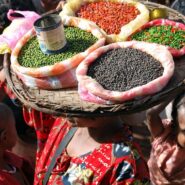 Important Safety and Cancellation Details
Important Safety and Cancellation DetailsMadagascar remains a welcoming and generally safe destination for travelers, even as the country navigates a transitional political moment. In mid-October 2025, following several weeks of youth-led political unrest, a transitional and provisional government was formed under Colonel Michael Randrianirina. This development, confirmed by the Constitutional High Court, sets the stage for democratic elections in the next 24 months. The transitional leadership has stressed its commitment to stability and constructive reforms, aiming to organize new elections and restore broader political normalcy over the coming months.
Further, in early December 2025, the US State Department classified Madagascar as a level 2 – the same level as most of Europe – a clear indication of their confidence in the new government’s intent. The U.S. Department of State classifies countries on a four-level travel advisory scale, ranging from Level 1: Exercise Normal Precautions to Level 4: Do Not Travel, based on security, health, and geopolitical conditions. These levels are updated regularly and help travelers understand the degree of risk associated with visiting each destination.
Distant Horizons will closely monitor the political and security landscape in Madagascar in the months leading up to the tour.
If, more than 30 days before departure, conditions shift in a way that compromises traveler safety, Distant Horizons will cancel the program and travelers will be fully refunded all payments made to Distant Horizons.
If, within 30 days of departure, conditions shift in a way that compromises traveler safety, Distant Horizons will cancel the program. In that event, travelers will receive 75% of the amount paid to Distant Horizons for the Madagascar tour as a direct refund issued by check. The remaining 25% will be provided as a credit applicable toward a future Cornell program with Distant Horizons within three years.
We encourage all participants to be aware of recent events and to understand that all travel carries risks. It is important to review the cancellation terms and date thresholds outlined in the “Terms and Conditions” section to ensure a full understanding with the timeline in the event that one makes an individual choice to cancel. For added peace of mind, we strongly recommend considering a comprehensive travel-insurance policy—ideally one that includes “Cancel for Any Reason” (CFAR) coverage—so travelers may make decisions aligned with their own comfort level and personal circumstances.
Please refer to Cornell's Travel & Safety Policy for additional related information.
Travel with Ivy League Faculty
-
Growing up in eastern Missouri, Cole enjoyed a childhood exploring nearby woods and creeks and returning from expeditions laden with all manner of creatures, living, dead, and fossilized. His interest in insects was fostered by a neighborhood physician with an avocation studying butterflies and while attending college at Washington University in St. Louis he studied animal behavior and neurobiology.
These topics became Cole’s principal interest: how an animal acquires sensory information, evaluates it, and produces adaptive behavior. He earned graduate degrees in insect behavior at the University of Kansas, where he met Linda. He did post-doctoral work in visual physiology at Indiana University, and in neuroscience at the University of Arizona before joining the Entomology Department at Cornell in 1992. Along the way, he spent a Fulbright year in West Germany, served a year as a program officer at the National Science Foundation, and taught for 7 summers at the Marine Biological Laboratory on Cape Cod. At Cornell, he has taught courses in Introductory Biology, Evolution, Insect Biology, Insect Physiology, Comparative Physiology, and Art & Vision for which he earned university, state, and national teaching awards. He served 7 years as Director of Undergraduate Biology and is currently Director of Undergraduate Studies in Entomology. He also enjoys working with “life-long learners” having taught 10 CAU on-campus courses, co-led multiple CAU Study Tours with Linda, and for the past 13 years has taught workshops for New York State Master Naturalists. When not biologizing, Cole enjoys cooking (and eating) dishes from a variety of cuisines, and listening to improvisational music, such as jazz and bluegrass.
-
"Cole is one of the funniest professors I have ever met. He knows his material so well and never refers to notes. He is a delightful and enthusiastic teacher filled with wonder and totally non-judgmental." ~CAU Summer 2024 participant
-
Dr. Linda S. Rayor, Senior Lecturer/ Senior Research Associate, has been on the faculty of the Department of Entomology at Cornell University since 1994. Linda teaches courses on how to do scientific outreach (Naturalist Outreach), Spider Biology and Social Animal Behavior: Arthropods to Apes. Her innovative teaching has been recognized by national societies (2016, 2008 Entomology Society of America; 2015 Animal Behavior Society) and within Cornell University (2007 Innovative Teacher Award; 2005 Kaplan Service-Learning Award). Linda is a behavioral ecologist whose research is focused on social spiders and other arachnids, with research experience on social dynamics in primates, prairie dogs, and paper wasps. Her current research focuses on the behavioral, physiological, and systematic patterns found in the large group-living and solitary huntsman spiders [https://www.sciencenews.org/article/subsocial-behavior-among-delena-huntsman-spiders]. She is Past President of the American Arachnological Society.
Helping others understand and appreciate science has permeated all aspects of Linda’s career – from running the Naturalist Outreach Program, a K-12 STEM Outreach Program which trains and sends Cornell students into classrooms to give hands-on presentations on biodiversity and ecology [http://blogs.cornell.edu/naturalistoutreach]., to starring in the nature documentary ‘Monster Bug Wars’ (@MonsterBugWarsTV), producing videos explaining nature-oriented biology with her Naturalist Outreach students (youtube.com/naturalistoutreach), and helping develop parts of Australian Museum’s stunning ‘Spiders: From Fear to Fascination’ blockbuster exhibit which is touring the USA and Canada, to leading CAU wildlife tours around the world. Along with tours, Linda has taught numerous CAU workshops on spiders. A proud field biologist, she has done research in Colorado, British Columbia, Mexico, Costa Rica, and Australia.
-
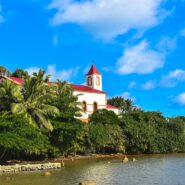
“Totally enjoyed Cole and Linda! They are passionate and knowledgeable about wildlife while also very clear when responding to a question with true knowledge.” ~Michael McNamara '84
Your experience, day-by-day
-
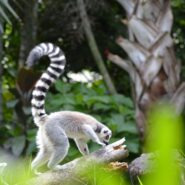 July 22 / Depart U.S.
July 22 / Depart U.S.Set off on your great adventure en route to Antananarivo, Madagascar!
-
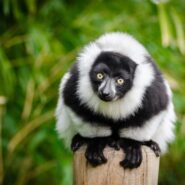 July 23 / Antananarivo
July 23 / AntananarivoArrive in Antananarivo and transfer to the Radisson Blu Waterfront Hotel. Get to know CAU faculty Cole and Linda, your Distant Horizons Tour Manager, and your fellow travelers over a glass of wine and a light dinner this evening.
(Meals included: Dinner)
-
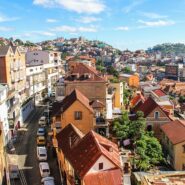 July 24 / Antananarivo
July 24 / AntananarivoSpend the day in a guided exploration of key sites in Antananarivo, (affectionately referred to as "Tana"). Admire the “Rova” where Malagasy’s rulers once lived on top of the highland capital’s highest hill. Admire the towered walls that guarded the central palace, a touch of Medici Florence and the triumphal entry arch. A few steps away admire the work of Malagasy artist Charles Rabemanantsoa whose detailed bas-relief tells the history of Madagascar. Close by is the country’s first Museum of Photography which provides a deep insight into the history of Madagascar through different periods. After lunch visit the Andohalo Cathedral to see one of the leading Gothic-style places of worship in the country. Imported Christianity has played a significant role in shaping Malagasy society and churches, not as grand as this cathedral, are found all over the country. End the day at the Is’Art Galerie, the only contemporary art space in the city. Formerly functioning as a laundry, now used as a creative space.
This evening enjoy a more formal welcome dinner at the hotel’s formal dining restaurant which serves French-themed cuisine.
(Meals included: Breakfast, Lunch, Dinner)
-
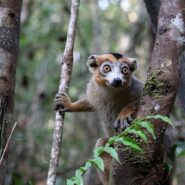 July 25 / Andasibe
July 25 / AndasibeHead east this morning to the Andasibe-Mantadia National Park. Travel along one of Madagascar’s best roads which links the capital to the country’s most important port of Toamasina. Drive by small villages where villagers make building bricks during this time of year and fields where vegetables are grown during the dry season and the paddies are used to grow rice during the wet season. Pass Moramanga, capital of the Bezanozano people, the earliest inhabitants of the island, where colorful rickshaws ply the streets. This small town is rapidly growing with an influx of nickel mines recently established by Canadians, Japanese and French. Spend time in Lemur Island, a private lemur sanctuary accessible only by a short boat ride. Despite the managed aspect of the park, time here provides an excellent opportunity to see a wide variety rescued lemurs that are somewhat tame. The principal four lemur species found here are the bamboo lemur, the black and white ruffed lemur, the brown lemur and the diademed sifaka.
Enjoy a freshly prepared dinner tonight using locally sourced ingredients. Overnight at the spectacular Mantadia Lodge.
(Meals included: Breakfast, Lunch, Dinner)
-
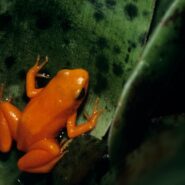 July 26 / Andasibe
July 26 / AndasibeSpend the day exploring Andasibe-Mantadia National Park inside the small Réserve Spéciale d’Analamazaotra. The ground here is reasonably flat and provides excellent opportunities to track down the rare indri whose unforgettable wail can be heard emanating from the misty forest throughout the day. There are about 60 resident family groups in the park. We may also see woolly lemurs, grey bamboo lemurs and the black and white ruffed lemur. In addition to lemurs, the park is home to the immense and colorful Parson’s chameleon as well as twenty species of amphibians including tomato frogs and mantellas. After dinner enjoy an evening guided walk, watching out for nocturnal animals such as tiny mouse lemurs and greater dwarf lemurs.
(Meals included: Breakfast, Lunch, Dinner)
-
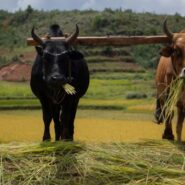 July 27 / Antsirabe
July 27 / AntsirabeDepart the hotel this morning for a long, but scenic day driving west and then south to Antsirabe along the famous N7 road. Green fields rise-up to red mountains and terraces cut deep into the mountains provide endless bucolic scenes of daily life. Along the way, enjoy stops to meet with local artisans. Visit a home where a simple kiln in the garden produces beautiful recreations of traditional Malagasy homes. It will be a day of landscapes and markets with the country’s beast of burden – the Zebu– never far from sight. The Zebu is essential to the life of the Malagasy people providing not just transportation but also play a critical role in the wide-spread farming practiced throughout the country. Arrive in Antsirabe late afternoon and transfer to the Couleur Café. The city is known for its textiles, tobacco and agricultural production.
Enjoy dinner this evening at the hotel.
(Meals included: Breakfast, Lunch, Dinner)
-
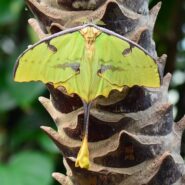 July 28 / Ranomafana
July 28 / RanomafanaThis morning our focus will be on the vibrant craft culture of the city much of which depends on the recycling of waste. Stop in at Chez Mamy where Mr. Rajamason creates miniature bicycles from recycled materials including soda cans, pieces of electric wire, bottle caps and more. Next door his wife makes exquisite embroidered cotton cushion covers and table cloths. At Atelier Corne de Zebu household objects are created out of Zebu horns using an old washing machine and discarded jeans. After lunch, drive along the plateau of central Madagascar further south to Ranomafana, which means “hot water” in Malagasy. Arrive at the Ranomafana National Park which is a part of the UNESCO inscribed Rainforests of Atsinanana.
Tonight, enjoy a gentle walk through the rainforest surrounding the lodge to spot some of the many nocturnal animals in the park including nocturnal lemurs, reptiles such as Uroplatus geckos, and many tree frogs, and fascinating invertebrates including the Madagascar comet (lunar) moth. Overnight at the Hotel Thermal Ranomafana.
(Meals included: Breakfast, Lunch, Dinner)
-
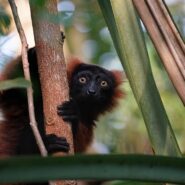 July 29 / Ranomafana
July 29 / RanomafanaThis morning explore the sub-humid evergreen Ranomafana National Park which was created in 1991 after Dr. Patricia Wright’s 1986 discovery of the rare golden bamboo lemur. The park’s landscape consists of rolling hills fed by rushing streams and a tough, uneven terrain which needs careful navigation. Accompanied by our guide, we will move slowly up and through the park in search of, for sure, the golden bamboo lemur but also the other 12 species of lemur, including the Aye-Aye. After a later lunch we will visit the spectacular Centre ValBio where we plan to meet with Mr. Florent Ravoavy, Coordinator of Conservation Education & Outreach Department. The architecturally stunning ValBio was created by Dr. Patricia Wright in 2003 to help both indigenous people and the international community better understand the value of conservation in Madagascar and around the world.
Enjoy dinner at the hotel tonight.
(Meals included: Breakfast, Lunch, Dinner)
-
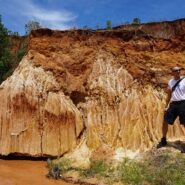 July 30 / Isalo
July 30 / IsaloThis morning drive southwest towards Isalo National Park with some interesting stops en route. Pass through Fianarantsoa, located on Ivoenana hill. The city is home to many intellectuals, schools, bookstores and over fifty Lutheran, Catholic and Presbyterian churches. The city is also known for its vineyards and tea plantations. Continue driving through a magnificent landscape of vineyards and terraced fields, descending from the central plateau to Ambalavao to visit a small family run business where silk is worked from the cocoon to the final woven product. Another workshop specializes in the production of Antaimoro paper, similar to parchment, from the bark of the AVOHA, a shrub endemic to southern Madagascar. After boiling and pounding, the fragments are poured with water into a shape and cut into sheets. Fresh flower petals are applied and the paper is set out to dry. Enjoy lunch at a local restaurant before continuing on to Isalo National Park. Arriving at the Isalo National Park in the later afternoon marvel at a breathtaking landscape of craggy rocks and dazzling mountains.
Dinner and overnight at the Isalo Rock Lodge, sculpted out of the local sandstone, and providing breathtaking vistas of this moon-like landscape.
(Meals included: Breakfast, Lunch, Dinner)
-
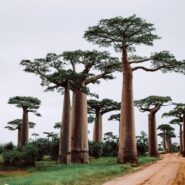 July 31 / Isalo
July 31 / IsaloThis morning we will set out to explore the Isalo National Park which was established in 1962 to protect a landscape dominated by a dramatic sandstone massif that had been eroded by time and weather into an otherworldly collection of plateaus, canyons, gorges and pinnacles. Iron and mineral deposits stain the rock formations a rainbow of different colors, and the dense forests and grassland plains that surround them are filled with unique flora and fauna. Isalo National Park lies in the southwestern Isalo Massif and is quite unlike anywhere else on the island. Biological highlights include several species of lemur and two locally endemic frogs. Birdlife in the area includes Benson’s rock-thrush, white-throated rail, Madagascar coucal, Madagascar wagtail and Madagascar kestrel. Reptiles and frogs are numerous including: Oustalet’s chameleon, jewel chameleon, spiny-tailed iguanid lizard, stump-tailed chameleon, Malagasy rainbow frog and the Isalo Madagascar frog. Plants endemic to the region include the dwarf baobab, Isalo aloe, kalanchoes, pandanus and the elephant’s foot plant. Depending on weather, we will determine a route. We plan to cover about three miles as we discover this landscape of dramatic ridges and high plateau where deep canyons are shot through with streams, lush vegetation and pools for swimming!
Return to the lodge for a free afternoon followed by a lovely dinner at the lodge.
(Meals included: Breakfast, Lunch, Dinner)
-
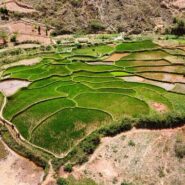 August 1 / Isalo
August 1 / IsaloEnjoy an early morning walk from Isalo Lodge. Paths close by the lodge lead across dry grasslands and rocky outcrops, with occasional palm trees and hardy plants breaking the horizon. Birds begin to call, and with luck, a ring-tailed lemur may be seen moving through the rocks. The walk is peaceful, with clear views of the valleys and canyons that make this area one of Madagascar’s most striking natural settings. Enjoy some free time after lunch at the hotel. This evening, we have planned a night visit to the Zombitse-Vohibasia National Park. This rarely visited, park falls within the eco region classified as Madagascar succulent woodlands, an ecoregion that is known for high local endemicity. Although we will be returning tomorrow morning, our goal this evening is to track down the elusive “fossa.” The most prominent predator in Madagascar is the fossa (Cryptoprocta ferox). While it resembles a slender, long-tailed cat, it is actually a member of the mongoose family and is Madagascar’s largest native carnivore. A significant part of the fossa’s diet consists of lemurs. Their semi-retractable claws, long tail for balance, and flexible ankles allow them to hunt prey both on the ground and in the trees, even climbing down headfirst. Although there are no guarantees we will do our best to track one down and a night visit, regardless, will offer other exciting possibilities.
(Meals included: Breakfast, Lunch, Dinner)
-
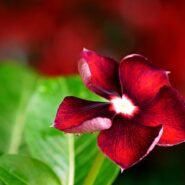 August 2 / Ifaty
August 2 / IfatyRetrace our steps west and return to the Zombitse-Vohibasia National Park for a different morning visit. The park’s dense dry forest shelters an astounding 85 recorded bird species including the Appert’s Greenbul which survives nowhere else in the entire world. Indeed, the park is known to be the showcase of the rich birdlife of Madagascar. Most of the birds in the park exist nowhere else. Lemurs are also an attraction here. Zombitse-Vohibasia is currently the only area for seeing the newly-described Zombitse sportive lemur (Lepilemur hubbardorum), which can easily be found even during the day as it peers out from daytime sleeping sites. Additionally, there are 33 reptile species including 9 species limited to the region cohabit on the site as well as 8 amphibian species, including colorful Mantella poison frogs that have independently evolved similar gaudy warning coloration to the Latin American poison frogs.
After lunch, continue on to Ifaty and our hotel for the night - Les Dunes d’Ifaty. Enjoy dinner at the hotel.
(Meals included: Breakfast, Lunch, Dinner)
-
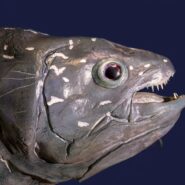 August 3 / Antananarivo
August 3 / AntananarivoThis morning we will depart the hotel, with provided snorkeling equipment, to explore the reef that stretches along the south-western coast of Madagascar making it one of the largest coral reefs in the world. To reach the reef, we will board a pirogue, a dug-out canoe, the primary means of transportation in these coastal areas. These pieces of makeshift art are managed skillfully by their crew who are so attuned to the direction of the winds that a journey that might take an hour is considerably less on a pirogue. The Toliara reef system is one of very few places in the world inhabited by the coelacanth, a 400-million-year-old species of fish. Over 6,000 different species have been recorded here, including four species of marine turtles, and eleven species of cetaceans. This afternoon leave the ocean for dry land and the Arboretum d’Antsokay, a kaleidoscope of fauna and flora condensed into one great micro-ecosystem in the island. Founded in 1980 by Swiss botanist Hermann Petignat, the main aim of the Arboretum association is to safeguard the endemic flora of southern Madagascar. Admire a remarkable collection of succulents, lemurs, radiated tortoises, snakes and chameleons, and many other species adapted to the region’s arid conditions. The collection of baobab trees located here is impressive with their striking shapes and sizes. These spectacular trees have also influenced human culture, inspiring innumerable arts, folklore and traditions.
Return to Tana and stay the night at Nosy Manga Hotel. Dinner at leisure this evening.
(Meals included: Breakfast, Lunch)
-
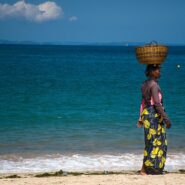 August 4 / Nosy Be
August 4 / Nosy BeTake a mid-day flight to the island of Nosy Be, located off the northwest coast of Madagascar. Nosy Be was first inhabited by migrant tribes from the Madagascan mainland, including the Antakarana and Sakalava people. Later, it was settled by traders from India, Comoros, and the Swahili Coast before being ceded to the French in 1840. Its capital, Hell-Ville, is named after the French governor of colonial Réunion, Admiral de Hell. Nosy Be became part of Madagascar in 1896 and gained independence, alongside the rest of the country, in 1960. Upon arrival drive to Mount Passot, named after the French naval captain Pierre Passot. From the terraced lookout, admire dense forests and the turquoise Mozambique Channel . Eight volcanic crater lakes dot the slopes, considered sacred by local Sakalava people. Appreciate the island’s volcanic origins, its lush biodiversity, its spiritual traditions, and the dramatic coastal panorama. Depending on timing we might be able to walk along one of the trails and spot chameleons, lemurs and exotic birds. At the summit, the lookout provides a sweeping 360-degree vista of Nosy Be and the surrounding islands scattered across the Mozambique Channel, especially magical at sunset when the sky burns gold and violet.
Transfer to the Ravintsara Hotel which sits along the coast surrounded by tropical gardens and views of the Mozambique Channel. Its bungalows are built from natural wood and stone, blending with the landscape and emphasizing calm and privacy. The hotel focuses on wellness, with a spa offering treatments that use local oils and botanicals. A large pool, open-air restaurant, and quiet beach access make it a peaceful retreat. Enjoy dinner this evening at the lodge.
(Meals included: Breakfast, Lunch, Dinner)
-
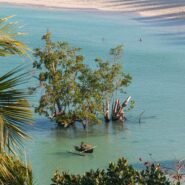 August 5 / Nosy Be
August 5 / Nosy BeThis morning we will focus on the wonderful waters around Nosy Be. We will take a boat to Nosy Sakatia where we expect to see a wide range of reef fish such as parrotfish, angelfish, butterflyfish, and clownfish. Green and hawksbill turtles are common, often feeding in shallow seagrass areas. Schools of snappers and fusiliers, as well as the occasional moray eel or octopus, are frequent sights. August falls during the humpback whale migration period and sometimes it’s possible to see surface sightings. Midday head to the Lokobe National Park, the last remaining primary forest in the region, known for being home to the rare black lemur and the Nosy Be panther chameleon. Located in the south-east of Nosy Be, the Lokobe forest covers a mountain considered the highest peak on the island and covers an area of 862 hectares. Initially a study area for scientists and closed to the public, the reserve has been open to ecotourism since the 28th of June 2014. The primary forest is home to more than 370 species of spectacular wildlife, including 16 species of bats, 11 species of primates, 84 species of reptiles and more than 100 species of birds. Access to the park is by pirogue and is influenced by the island’s semi-diurnal tidal system, meaning there are two high tides and two low tides each day. The tidal range averages about 2 to 3 meters. At low tide, it is not possible to take the boats all the way to the park and there is a chance we will need to walk along wide mudflats to reach the park. After lunch walk through the primary forest looking for snakes, geckos, frogs, chameleons, kingfishers and, of course, lemurs including mouse lemurs, the Nosy Be sportive lemur or even the endangered black lemur. Despite their name, only the males in this species are black, the females are a reddish-brown color.
(Meals included: Breakfast, Lunch, Dinner)
-
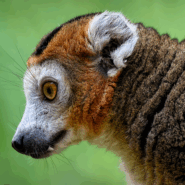 August 6 / Depart for home
August 6 / Depart for homeReturn home directly from Nosy Be to Addis Ababa and beyond.
Register Now
-
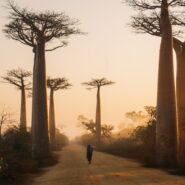 Madagascar: Lemurs, Chameleons, & Baobabs. Oh, My!Download
Madagascar: Lemurs, Chameleons, & Baobabs. Oh, My!DownloadJuly 22 – August 6, 2026
To reserve your space, contact CAU partner Distant Horizons
Phone: 562-983-8828 | Email: emilyw@distant-horizons.comDownload the Brochure
You might also be interested in
-
Week One: July 5 - 11 | Week Two: July 12 - 18
Take a riveting one-week CAU Summer course in your favorite subject taught by leading Cornell faculty on campus. Alumni, family, and friends are welcome.
About CAU
-
CAU is your first choice for in-depth, lifelong learning with Cornell faculty in the classroom and around the globe.
-
We're so excited to travel with you! Make sure you read the travel and safety policy for important information about all Cornell Alumni Travel and CAU opportunities.
-
We are committed to ensuring that CAU and Cornell Alumni Travel tours provide a welcoming and inclusive experience for everyone. You can find the expectations that are applicable to all attendees of Cornell University alumni events, both on and off campus, by visiting this link.

